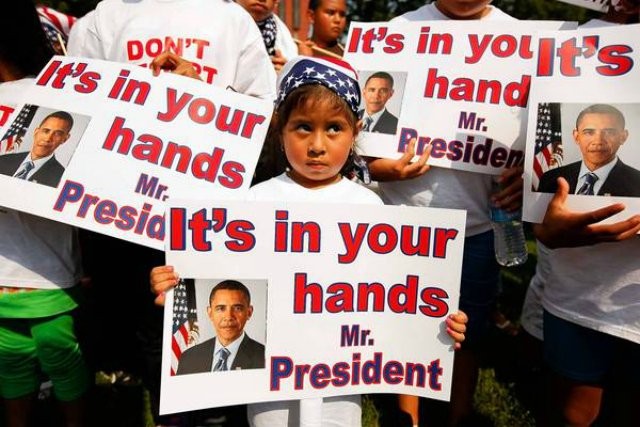
We doubt that Senator Ted Cruz will win the 2016 Republican nomination, much less the presidency, and he’ll lose because of the hypocritical position he’s adopted on immigration. Everyone who follows politics can see this, except Ted Cruz.
Cruz is a well-educated man with an undergraduate degree from Princeton, a law degree from Harvard, and a judicial clerkship with former Chief Justice William Rehnquist. Despite this, and the fact that Cruz and his family have benefited from generous immigration laws and policies in the United States and Canada (his father emigrated from Cuba to the U.S. in 1957, Ted was born in Canada), he offers zero creative leadership in addressing a broken U.S. immigration system.
Senator Cruz’s focus is on “border security.” He sponsored a bill to increase, by 300 percent, the number of immigration agents at our southern border. He’s also called for abolishing the Internal Revenue Service and sending all revenue agents south to secure the border. We really don’t need an army of accountants at the border, and Cruz, of course, ignores the fact that the border patrol is already five times larger than it was 20 years ago. Next, Cruz calls for overturning President Obama’s executive orders on deferred action, which allows millions of undocumented people to live, work, study, and keep their families together (at least temporarily) in the U.S. Cruz also signed onto a friend of the court brief in support of the lawsuit brought by 26 states that has halted the President’s “Deferred Action” program.
Cruz’s gaze south is disconcerting at best and racist at worst. His emphasis on militarization of the southern border suggests that threats to our national security originate in our geographic south, though there’s no real evidence to support this.
Cruz’s position of more security and penalties for undocumented immigrants who have “jumped the line” to come to the U.S. will not play well with Latino voters. Such voters want Latino citizens, visitors, and the undocumented treated respectfully by American politicians and citizens. They want educational opportunities — such as tuition equity policies — they want access to basic health care, and they want a pathway to succeed in our nation through hard work, not via handouts. Cruz’s inability to grasp the extent of his own immigration privilege has led him into a Latino lasso from which there is no escape.
The difference between Cuban-Americans and other Hispanics among us is significant and requires some historic perspective. First, the 1959 Castro revolution in Cuba, which started out nationalist and quickly turned Marxist-Leninist, has deeply influenced United States immigration policy toward that island nation. Essentially, Cubans who fled Cuba in the aftermath of the revolution have been welcomed and supported by the United States’ people and government.
The path of Cuban immigrants contrasts sharply with that of immigrants from the rest of Latin America and the Caribbean, many of whom suffer serious social deprivation in their homelands. For example, Haitians are treated unkindly by our immigration system despite United Nation-supplied social statistics that show deep economic despair: Life expectancy in Haiti is 64 years, compared to 80 in nearby Cuba. Public expenditure on health care in Haiti as a percentage of GDP is 6.4 percent (in Cuba it’s 8.6 percent), and the population living below minimum level of dietary energy consumption is 51.8 percent in Haiti, in Cuba it’s 5 percent.
People of Mexican descent living in the United States are neither impressed nor energized by the Cruz anti-immigration rhetoric. Of the roughly 54 million Hispanics living in the U.S., 64 percent are of Mexican descent. By comparison, 3.7 percent are of Cuban descent. Mexican Americans, Haitian Americans, and others who wish to come to the U.S. recoil against sanctimonious speak from those who have enjoyed special immigration privileges. Cruz, like any candidate seeking to win a national election, can only succeed by building a strong coalition with Hispanics across racial, cultural, and socio-economic boundaries. He’s unlikely to sway anyone in the U.S. with tired, hollow talk of militarizing the border. Only bipartisan, thoughtful, comprehensive immigration reform can help create a sane, equitable, and humane system. The Texas senator has energetically fought against this sort of reform. For this reason alone, Ted Cruz seems determined to lose.








